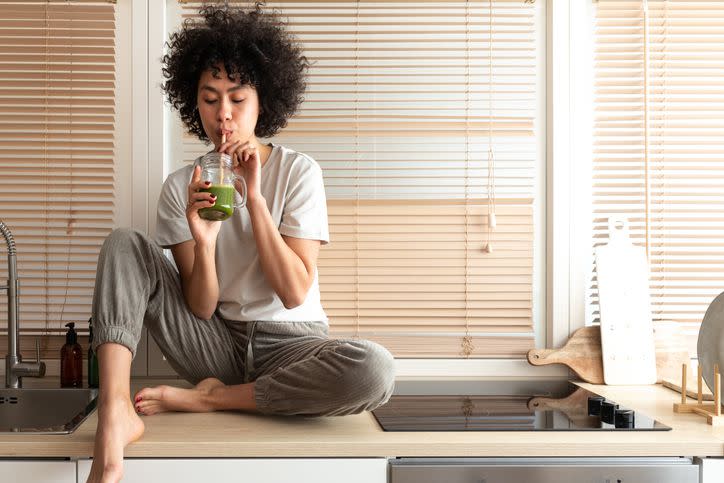Juicing vs. Blending

Daniel de la Hoz / Getty Images
Medically reviewed by Karina Tolentino, RD
Based on their sex, adults need 1.5 to 3.5 cups of fruits and vegetables—which are good for you—every day. When looking for a nutritious produce-based drink, you might wonder: Are smoothies good for you, or are juices healthier?
Either can be: Smoothies are made from a blend of whole foods while juicing usually extracts the liquids from fruits and vegetables. Here's what else you need to know about juicing vs. blending.
Juicing vs. Smoothies
Juices and smoothies are both types of drinks with fruit and vegetable ingredients. Whether you juice or blend them, they can help you consume more produce in your diet.
The way the drinks differ is how the fruits or vegetables are processed. Juicing entails removing the solid parts of produce—like pulp, seeds, and skin—and leaving a juice-only product. Blending involves liquefying a fruit or vegetable, usually with another liquid like water or milk.
Are Smoothies Good for You?
Smoothies can be good for you, partly because you can get more nutrients since most of the fruit or vegetable is added. The ingredients you use to make your smoothie also play a role in its benefits or risks.
Benefits
Because smoothies usually involve blending whole foods, all the nutrients from fruits and veggies remain intact. For instance, you can retain some of the fiber content for some unpeeled produce. Other benefits include the ability to:
Add extra-nutritious ingredients, such as protein, healthy fats, and superfood ingredients like matcha, to make a balanced drink
Replace a meal like breakfast—with a healthcare provider or registered dietitian's guidance
Use it as a post-workout recovery drink
Risks
While drinking smoothies has its benefits, there are also some downsides involved, including:
Consuming more servings of fruits and veggies than normal. While this might seem good, it can mean gulping down more calories than you can burn. If your goal is weight loss, you have to burn more calories than you consume.
Decreasing the feeling of satiety. Though smoothies can make you feel fuller than juices, they may only be temporarily satisfying after you finish them. For example, one study found that fruit salad was more filling than a fruit smoothie.
Increasing added sugar intake. Adults' recommended added sugar intake is less than 10% of the daily calorie intake. You may be consuming that in just one smoothie, depending on the ingredients you include. Smoothies are known to contribute to added sugar amounts.
Is Juicing Healthy?
Like smoothies, juices can be healthy to a degree. Juicing can fill a nutrition gap for people who are on the go or don't get enough nutrients through their diet. It all comes down to the ingredients and preparation.
Benefits
Juicing has similar benefits to those of smoothies. Additional benefits of juicing include:
Increased nutrient intake: Because juices are so concentrated, even a small portion can provide the nutrient equivalent of several servings of fruits and veggies.
Increased veggie intake: Some people dislike veggies and can go days without eating them. Juicing is a way to increase the range of vegetables a person consumes.
Risks
It's best to be mindful of what's in your juice and how much you drink. Choosing to juice does come with some nutrition-based risks, which are that you:
Could experience a blood sugar spike with juices made with fruit or high-sugar vegetables such as beets and carrots since the carb content is higher
Lose out on fiber, a type of carbohydrate that's an important part of a healthy diet
A Quick Review
Smoothies, generally made by blending whole fruits and vegetables, leave the nutrients intact and serve as a balanced meal with the right ingredients. You could also inadvertently consume more calories than you burn if you have a smoothie with a full meal.
On the other hand, drinking juice can be a great way to get nutrients if you tend to skip meals or avoid fruits and veggies. Juicing does leave fiber behind and can cause your blood sugar to spike.
For more Health.com news, make sure to sign up for our newsletter!
Read the original article on Health.com.

